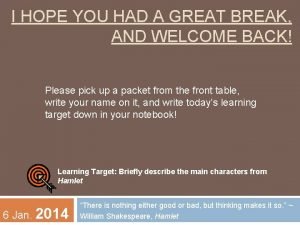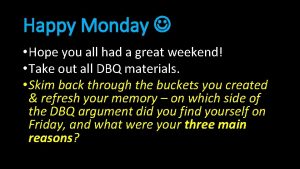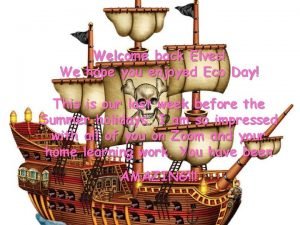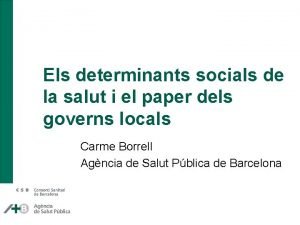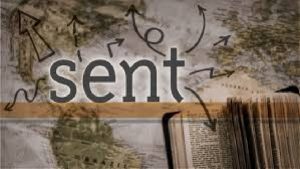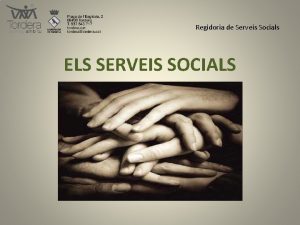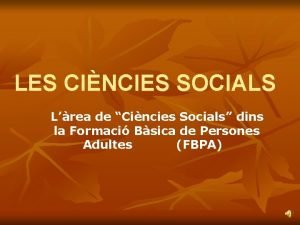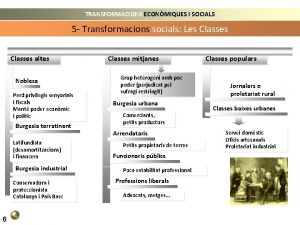Welcome to Socials I hope you had a













- Slides: 13

Welcome to Socials! I hope you had a good weekend! Today we will be continuing with our government unit and looking at the different branches of government and how it works. Check-In – take out a piece of paper and answer the following questions: 1)What area of government does public transportation fall under? A) federal b) provincial c) municipal 2)What area of government does utilities such as waste management fall under? A) federal b) provincial c) municipal 3) Read the following news headline: “Recent increase in taxes will harm small business owner. ” Which political ideology does this reflect? A) socialism b) communism c) conservatism d) liberalism 4) All people should be equal – which side of the political spectrum does this ideal represent? 5) Point form: Which political system would you most like to live in and why?

Check – in Answers: 1) Public transportation A - provincial 2) Utilities C – municipal 3) Taxes will harm business owner C – conservative 4) all ppl. Should be equal – left side

Political Ideologies – Pros and Cons • Pull out your ideology chart from last class – Share with a partner some pros and cons you had for each ideology. Be prepared to share with the class.

Effecting Politics Imagine Mr. Moino quit tomorrow and a new principal came in to take his place. This Principal implemented the following rules: 1) Only ‘A’ students are allowed to participate in sports or any extracurricular activities 2) There will be NO EXCUSES of ANY sort for late work. Teachers will give a 0 on that assignment. 3) All girls must wear knee length skirts and shirts with necklines above the collarbone 4) All boys must wear button-down shirts accompanied by a tie 5) The principal will be the sole person who chooses Grad Council, Grad of the Year and Student Council. Discuss with the people around you: Which rules do you accept (if any) which rules do you reject and why? What exactly would be your plan of action if you did not agree with the principals new rules? Be realistic. Who do you speak to for advice on what action you would take? Who do you contact

Our Political System • Our system has checks and balances in place that prevent one person/government from inflicting their will and rules against others. – Many steps are in place before laws can be created / enforced – There is many opportunities for citizens to oppose new laws, disagree with policies before they are sent into place.

Canada’s Parliamentary System According to Rick Mercer And Training for citizenship: https: //www. youtube. com/watch? v=6 WNrsn. Rjt x. Q

Canada’s Parliamentary System

Executive Branch Makes and applies government decisions Prime minister: heads gov’t, controls how things are run Provincially premier (Christy Clark) Cabinet - group chosen by the PM (or Premier provincially) to help run the gov’t – advisors chosen from ruling party each runs a gov’t dept, eg. Finance; Education Must show cabinet solidarity once decision is made. If they cant agree they may be asked to resign.

Executive Cont. Backbencers: members of the governing party who are not in the cabinet Shadow cabinet: members of parliament from the official opposition Public service: largest part, performs gov’t services, senior civil servants powerful advisors to cabinet ministers

Legislative Branch Debate, make laws and amend laws Queen – who is represented by the gov. general currently David Johnson Main function – signs off on bills to make them laws Provincially – lutenant governor House of Commons - elected members of parliament that make laws. Political party With largest number of MPs form gov. (currently Conservatives) Provincially – BC legislative assembly Senate – appointed members who look over proposed laws from House and suggests ways to improve them – amendments

Senate - Controversy • Do you think the Senate is important and essential for our government? Why or why not?

How a Bill Becomes Law First Reading • Bill is introduced in the House of Commons • Not debated at this point Second Reading • Principle and purpose of the bill debated in the House of Commons Committee Stage • A committee examines the bill and makes changes (amendments)

Report Stage • Committee reports changes to House of Commons and House of Commons reviews it Third Reading • MP’s have final chance to view and change bill Senate • Bill sent to Senate to be reviewed • This step skipped if it’s a provincial bill Royal Assent • Governor General (or Lieutenant-Governor) gives bill royal assent (makes it a law)
 Welcome back i hope you enjoyed your vacation
Welcome back i hope you enjoyed your vacation Welcome back hope you enjoyed your vacation
Welcome back hope you enjoyed your vacation Welcome back hope you had a great vacation
Welcome back hope you had a great vacation Welcome back hope you are feeling better
Welcome back hope you are feeling better I hope you are back from vacation
I hope you are back from vacation I have eaten breakfast
I have eaten breakfast Nucleotide structure
Nucleotide structure I hope you had a relaxing holiday
I hope you had a relaxing holiday I hope you had a good break
I hope you had a good break Happy monday hope you had a great weekend
Happy monday hope you had a great weekend Welcome back i hope you enjoyed your vacation
Welcome back i hope you enjoyed your vacation Welcome back i hope you enjoyed your vacation
Welcome back i hope you enjoyed your vacation Welcome back i hope you enjoyed your vacation
Welcome back i hope you enjoyed your vacation Determinants socials de la salut
Determinants socials de la salut








